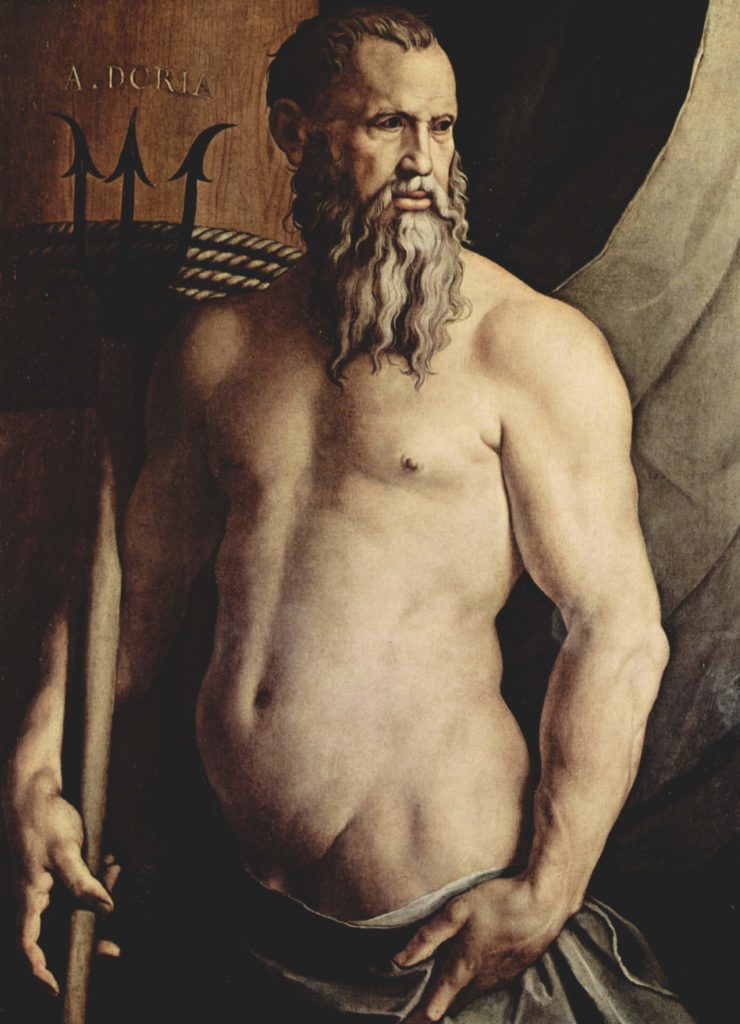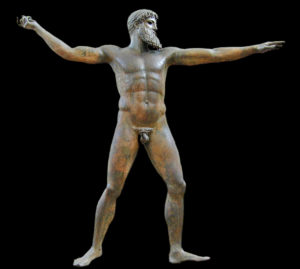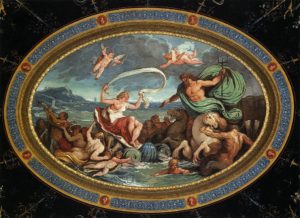
Portrait of Andrea Doria as Neptune by Angelo Bronzino. Retrieved from Wikipedia Commons.
It’s Poseidon Week here at andrewjpeterswrites.com! From Monday, August 29th to Thursday, September 1st, I’ll be posting stories, images, and interesting facts about the famous trident-wielder to celebrate the August 29th release of Poseidon and Cleito exclusively on Amazon. You’ll also find excerpts and some extras from the book. And I’m running a contest. Drop a comment, like, or share any post on my website, or my Facebook page, and you’ll be entered into a raffle for Poseidon swag provided by Zazzle. Winners will be chosen Thursday, September 1st 9:00PM EST.
So what is it you could win? Your very own Poseidon t-shirt, Poseidon mug, or Poseidon notebook. Winners will need to provide their e-mail address and mailing address for shipping.
For today’s post, I thought I’d share some of my thoughts about Poseidon and some lesser known stories about him. Poseidon was never my very favorite personage from Greek mythology. Growing up, I was more drawn to the heroic tales of Jason, Perseus, and Theseus. When I came out as gay, I found new favorites in the stories of Zeus and Ganymede, and Apollo and Hyacinth. But there was always something sympathetic for me about gloomy, aloof Poseidon.
He strikes me as a lonely guy, perhaps misunderstood, lashing out at mortals from some inner torment, whether borne from being overshadowed by his older brother Zeus or something else that was never elaborated on. Most of the Greek gods could be said to be moody and capricious in their sorting out of mortal matters, but it seemed particularly tough to get on
Poseidon’s good side. Being a natural skeptic, I’ve wondered if that was a fair portrayal.

“Artemision Zeus or Poseidon,” a famous 5th century BCE bronze statue at the Athens Museum of Archeology
An interesting thing about Greek mythology is that it changed throughout the eras, and most of what endured, what we recognize today, is from the classical era when Zeus and Athena were prominent and beloved. Some scholars believe that the worship of Poseidon was more widespread in earlier time periods and that his significance extended beyond an association with sea and storm. To people of an earlier age, he was probably a beneficent god of an earthly realm, worshiped for fertility and good harvests. Another matter is that the similarity in Poseidon and Zeus iconography makes it hard to determine which god was most popular among the Greeks, or whether they were both offshoots of a father god archetype.
Poseidon remained an important figure in religious practice and folklore throughout and beyond the classical period (and of course, many centuries forward via the Romans co-opting him as Neptune). But for the most part, he was portrayed as fearsome and villainous in the stories from the classical era. In Homer’s Odyssey, for example, Poseidon is an antagonist to the hero Odysseus, preventing the Trojan war hero from returning home to Ithaca in retribution for blinding his son Cyclops. Plato’s story about Poseidon’s kingdom Atlantis in his Critias and Timaeus dialogues has the patron god’s country destroyed by a morally and–one would have to argue–supernaturally superior Zeus.

“The Marriage of Poseidon and Amphitrite” by Italian painter Felice Giani (image retrieved from Wikipedia Commons)
Poseidon and Cleito is a retelling of that legend, including the perspective of the woman Plato named as Poseidon’s wife. A more well-known wife of Poseidon’s from folkore is Amphitrite, who was a Nereid (a daughter of the archaic sea god Nereus), and a sea-goddess herself. Of more notoriety, Poseidon was said to have seduced or even raped the beautiful maiden Medusa in his sister Athena’s temple, which angered Athena so much, she transformed Medusa’s hair to serpents. The Greeks had little charity for women in their myths.
A point of contrast with Zeus: while his older brother was the father of some of the most popular heroes from Greek mythology (Perseus, Heracles), Poseidon was the father of some of the most well-known monsters, such as Polyphemos, also known as the Cyclops, and Charybdis, the female whirlpool monster, of the famous Scylla and Charybdis, aka “the rock and a hard place.”
One last bit of trivia, Poseidon had male lovers too. One particularly interesting story is that of Nerites, who was the handsome brother of the beautiful Nereids (sea nymphs). Both Aphrodite and Poseidon fell in love with Nerites, and the young man refused the love goddess and chose Poseidon, who made him his charioteer.
Let me know what you think about Poseidon by dropping a comment below, and I’ll enter you in the raffle for Poseidon swag!
